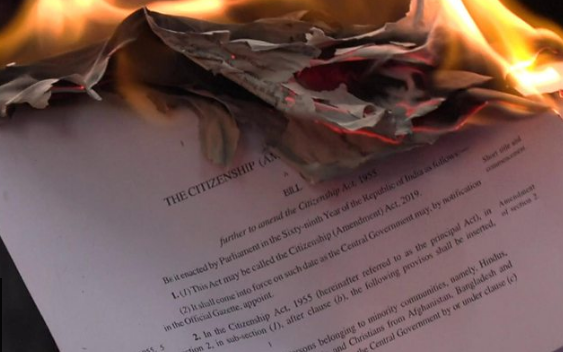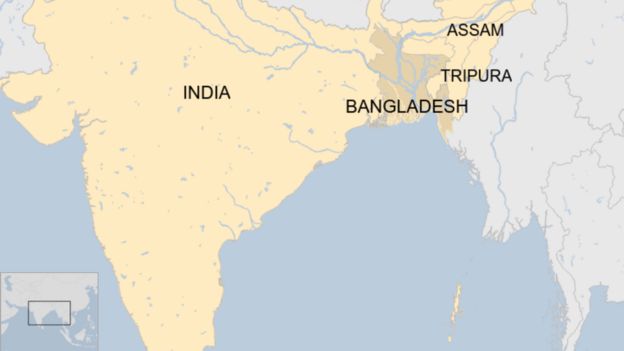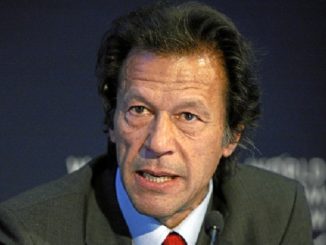
At least two people have died in clashes with Indian police in the north-eastern state of Assam, officials said.
Police said the two had been caught in crossfire in the city of Guwahati where thousands had ignored a curfew to protest against a new citizenship bill.Troops have been deployed in parts of Assam and neighbouring Tripura state.
The Citizenship Amendment Bill (CAB) offers amnesty to non-Muslim illegal immigrants from three countries.
Critics across India say the bill is discriminatory. In the north-east, protesters claim they will be “overrun” by migrants from Bangladesh.
Prime Minister Narendra Modi has appealed for calm.
The bill – which applies to people from Afghanistan, Bangladesh and Pakistan – was passed in the upper house of parliament on Wednesday night. It is yet to be signed by the president, but that is considered a formality.
The ruling Hindu nationalist Bharatiya Janata Party says the CAB will give sanctuary to people fleeing religious persecution.
Illegal migration from Bangladesh has long been a concern in India’s north-east. Assam is one of India’s most multi-ethnic states and includes Bengali- and Assamese-speaking Hindus and various tribespeople.
A third of its 32 million citizens are Muslims, the second-highest number after Indian-administered Kashmir.
How have the protests intensified?
Police in Assam confirmed to the BBC that two people had died in what they called “crossfire” between officers and protesters in Guwahati. It was not clear which side fired the fatal shots. Several police officers were injured, a statement added.
Despite appeals for calm, thousands of protesters again took to the streets in parts of Assam and Tripura, both of which border Bangladesh.
About 5,000 paramilitary troops were sent to Guwahati where a curfew was widely ignored. Protesters there set fire to vehicles and buildings and battled security forces.
A convoy of vehicles that included state police chief Bhaskar Jyoti Mahanta was attacked in the city by a crowd throwing stones on Thursday, Indian media reported.
No-one was hurt, police said, but reporters at the scene said the convoy had to stop several times.
Police fired blanks into the air as well as tear gas to disperse crowds.
At least four railway stations in Assam were damaged as protesters tried to burn them down, transport officials said.
Meanwhile, police in Tripura state said about 1,800 people had been arrested since Wednesday, local media reported.
Flights and rail services have been disrupted across the region.
Prime Minister Modi sought to reassure people in Assam, telling them they had “nothing to worry” about.
“The central government and I are totally committed to constitutionally safeguard the political, linguistic, cultural and land rights of the Assamese people,” he tweeted.
However, with internet and mobile services shut down, it is unlikely residents would have been able to read the message.
What do protesters want?
They want the bill to be repealed, as they say their ethnic and cultural identity is under threat from illegal migration.
Essentially, they do not want any migrants – regardless of religion – to be allowed into the state.
What is further fuelling passions in Assam, is the fact that two million residents – deemed to be illegal immigrants- were left off a citizens’ register last August.

The National Register of Citizens (NRC) is a list of people who can prove they came to the state by 24 March 1971, a day before neighbouring Bangladesh became an independent country.
In the run-up to its publication, the BJP had supported the NRC, but changed tack days before the final list was published, saying it was error-ridden.
The reason for that was a lot of Bengali Hindus – a strong voter base for the BJP – were left off the list, and would possibly become illegal immigrants.
The CAB is seen as being linked to the register, although it is not the same thing. It will help protect non-Muslims who are excluded from the register and face the threat of deportation or internment.
Has the bill been challenged?
The Indian Union Muslim League, a political party, has petitioned the country’s top court to declare the bill illegal.
In their petition to the Supreme Court, the Indian Union Muslim League argued that the bill violated articles of equality, fundamental rights and the right to life.
More than 700 eminent Indian personalities, including jurists, lawyers, academics and actors, have signed a statement “categorically” condemning the bill.
Investigative journalist Rana Ayyub told the BBC that it was sending out the wrong message.
“Clearly you are catering to your Hindu base by telling them that this country is only for Hindus,” she said.
“The world’s biggest democracy had a big heart when it could accommodate people. Right now we are coming across to the world as petty vindictive civilisation. That’s not what India stood for.”
Source: bbc.co.uk






Be the first to comment